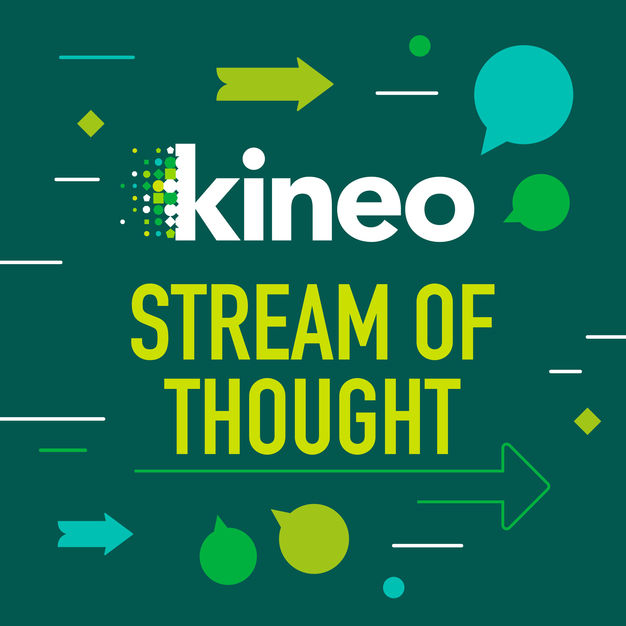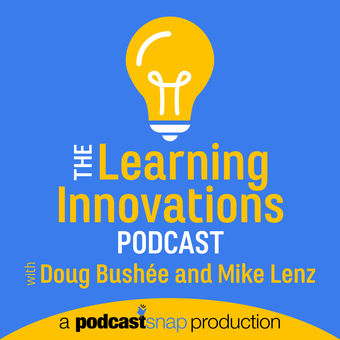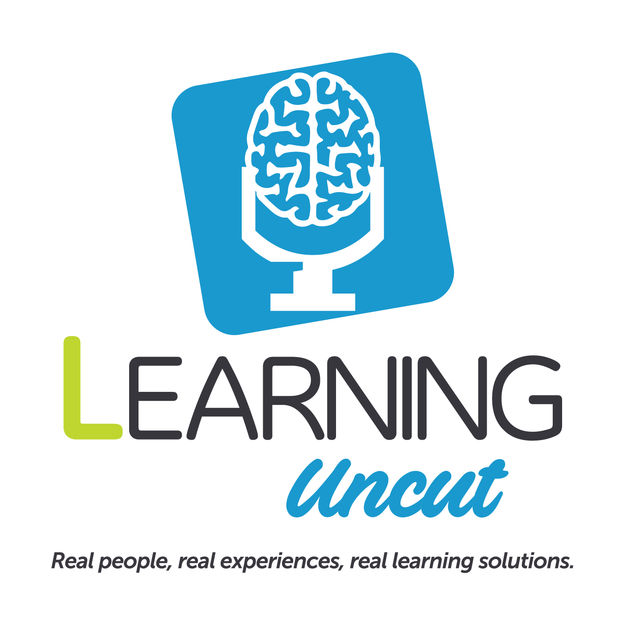
Learning While Working Podcast
Sprout Labs
Listen to the Learning While Working podcast to hear how learning and development is transforming. The episodes are interviews with leading thinkers in learning. Common themes on the podcast include trends in eLearning and digital learning, performance driven instructional and learning design and learning data. Each podcast is packed with ideas, tips and insights about how to make learning at work succeed.
- 33 minutes 4 secondsThe NOCOURSE Approach to Learning Design with Anamaria Dorgo
In this episode of the Learning While Working Podcast, Anamaria Dorgo Anamaria Dorgo, the founder of Handle With Brain, shares her innovative "No Course" approach to learning design. Learn how to create sustainable learning communities, encourage participant-led experiences, and leverage curiosity and adaptability in the learning process.
About Anamaria Dorgo
Anamaria Dorgo is a Learning Experience Designer, Facilitator, and previously the Head of Community at Butter. With degrees in psychology and human resources, she has a lifelong commitment to learning, resulting in her creating engaging learning experiences for a global community. She is the founder of Handle with Brain, an experience design consultancy.
Key takeaways:
- Collaborative Learning: The "No Course" approach is based on peer-to-peer interaction and mutual support, encouraging participants to learn by doing and sharing real-time feedback. Ideal for projects involving new technologies, such as AI.
- Community Building: Start small with passionate peers, prioritise co-creation, and let the community grow organically. Shift from a service provider mindset to a collaborative, participant-led approach for sustainable development.
- Action-Based Learning: hands-on, context-specific projects help participants focus on their personal and professional growth. Bi-weekly sessions with peer coaching and practical workshops ensure continuous progress and learning.
Segmented time stamps:
- (00:00) Introduction
- (05:08) Experimenting with peer coaching and the liberating structure called Troika consulting
- (12:40) Switching meetings to weekly, adding workshops and speakers.
- (15:04) How content is enhanced by peer sessions.
- (18:04) Auditing requires thorough individual analysis first.
- (21:45) Having a Slack channel for communication and cohort updates.
- (24:24) Collaborative learning fosters accountability and progress.
- (30:04) Communities start small and grow through shared value.
- (31:20) Collaborative learning is about inviting questions and finding answers.
Links from the podcast:
- Connect with Anamaria Dorgo on LinkedIn
- Check out her website
- More about the course
- Learn more about Liberating Structures
- Listen to Mapping Ties
25 October 2024, 1:00 pm - 32 minutes 8 secondsStorytelling for learning with Rance Greene
In this episode of the Learning While Working Podcast, Rance Green talks about the transformative power of storytelling in learning. He shares his "instructional story design" method, emphasising the need to understand the learning audience deeply and integrate conflict effectively into training narratives. Rance also provides practical advice on creating impactful training stories that act like flight simulators for the brain, driving both context and action.
About Rance Greene
Rance Greene is a story designer, author and speaker. Rance helps leaders connect with, inspire, guide and persuade their people through story-based messaging. He also equips talent development professionals to reach business outcomes through story-based training. A leader, consultant, coach and frequent speaker in live and virtual sessions on leadership storytelling, story-writing and instructional story design.
Key takeaways:
- Understand your audience: Rance emphasises the importance of deeply understanding your learning audience to create relatable characters and scenarios. This ensures the training is tailored to their specific needs and resonates on a personal level.
- Incorporate conflict: One of the essential elements of a compelling story is conflict. It engages the audience and drives the narrative forward. Rance highlights that stories in training should end at the height of conflict to leave a lasting impression and a desire for resolution.
- Story design as a process: Rance’s "instructional story design" method combines analytical and creative steps, making storytelling accessible to everyone, even if you don’t see yourself as a natural storyteller. By focusing on behaviours and actions, training stories become both relatable and actionable.
Segmented time stamps:
- (00:00) Introduction.
- (06:12) Scenarios compared to stories.
- (11:08) Training stories need relatable characters and conflict.
- (16:07) Encourage stakeholder responsibility through system-based thinking.
- (18:22) How will training benefit individuals personally?
- (25:21) Start a story, resolve conflict, and ask reflective questions.
- (28:39) Efficiently teach storytelling: conflict, action, brevity.
Links from the podcast:
- Connect with Lance Greene on LinkedIn
- Read ‘Instructional Story Design’
- Visit NeedAStory.com
27 September 2024, 10:00 pm - 24 minutes 32 secondsCuriosity in the age of AI with Lisa Bodell
In this episode of the Learning While Working Podcast, Lisa Bodell, CEO of FutureThink and a global leader in simplification and innovation, explores the vital role of curiosity in our rapidly evolving AI landscape. Robin and Lisa discuss the power of asking "killer questions," fostering a culture of curiosity, and the irreplaceable human touch in creativity and problem-solving. Lisa also shares practical examples and insights on how diverse questioning can lead to innovative solutions in both work and personal life.
About Lisa BodellLisa Bodell is an award-winning author and CEO of FutureThink. She has repeatedly been selected as one of the Top 50 Keynote Speakers in the World and recognized as one of the top 50 futurists. As a futurist and expert on the topic of innovation and simplicity, she serves as a global council member of the World Economic Forum, and has helped thousands of senior leaders ignite innovation at Bloomberg, Pfizer, Lockheed Martin, and more.
Key takeaways:- Curiosity as a Skill: it is not just a natural trait; it's a skill that can be taught, practised, and sharpened. Organisations must foster a culture where asking questions is encouraged and safe.
- The Power of Better Questions: in the age of AI, the quality of answers is directly tied to the quality of questions. Instead of defaulting to straightforward queries, try "question storming" to expand your thinking and uncover new possibilities.
- Thinking Time is Crucial: Lisa emphasised the importance of carving out time for deep, uninterrupted thinking. This isn't just beneficial for innovation at work but for personal growth too.
Segmented time stamps:
(00:00) Introduction
(03:54) How brainstorming problems unlocks creative solutions.
(08:28) Innovation involves uniqueness, not identical prompts and answers.
(10:42) Use provocative questions to inspire disruptive innovation.
(13:05) Lack of preparation and time stifles creativity.
(16:32) Progress comes from creating multiple iterations.
(22:05) How ‘The Artist's Way’ nurtures creativity through daily writing.
(23:04) Monthly thinking day eases personal and business challenges.
Links from the podcast
- Connect with Lisa Bodell on LinkedIn
- Visit FutureThink
- Read The Artist's Way
13 September 2024, 10:00 pm - 22 minutes 10 secondsLeveraging chat platforms for learning with Sarah Hawk
In this episode of the Learning While Working Podcast, Sarah Hawk, co-CEO of Discourse, shares the transformative potential of chat platforms in facilitating learning and collaboration in the workplace. The conversation explores the concept of "fast lane" and "slow lane" chat environments, emphasising the significance of intentional information architecture and fostering a culture of open, transparent communication, and much more.
About Sarah Hawk
Sarah Hawk is an expert in online community building and manages the team that builds Discourse, the 100% open source discussion platform built for the next decade of the Internet. Prior to her current role, Hawk was Head of Community at community consultancy FeverBee.
Key takeaways:
- Intentional Information Architecture: Hawk emphasises the importance of designing a well-structured information system. Ensuring people know where to post questions, how to find answers, and how to retain and document knowledge is crucial for long-term organisational growth.
- Mindful Cultural Building: Building a culture that encourages open communication, prolific question-asking, and transparent storytelling enriches the learning experience. It's about taking people on your journey, not just arriving at the destination.
- Fast Lane vs. Slow Lane in Chat Platforms: Understanding the distinct roles of real-time (fast lane) and more permanent, reflective discussions (slow lane) helps optimise chat platforms for both immediate collaboration and long-term knowledge retention.
Segmented time stamps:
- (00:00) Introduction.
- (04:05) Communication in remote workplaces and its impact.
- (09:18) Empowerment through intentional and mindful discussion.
- (11:51) Archiving fast-paced conversations systematically.
- (14:41) Building community through setting guidelines.
- (18:52) The need for a flexible platform for knowledge sharing and safety.
- (20:55) Insights on information architecture, culture and learning.
Links from the podcast:
23 August 2024, 10:00 pm - 24 minutes 38 secondsHarnessing AI for skill management with Kayvon Touran
In this episode of the Learning While Working Podcast, Kayvon Touran shares the transformative potential of AI in skill management. Tune in as we unpack the pivotal role of context in making skill frameworks effective and the innovative ways AI can address the nuances of managing skills within organisations. Kayvon also reveals how AI can streamline data collection and enhance skill assessments through dynamic simulations.
About Kayvon TouranKayvon Touran is the CEO and co-founder of Zal.ai. Kayvon has spent his entire career working in early stage technology startups, and most recently as a product leader in education technology where he created and implemented a next generation lifelong learning platform for higher education institutions.
Key takeaways:- Context is king: Generic skill definitions won’t cut it. Kayvon shares how customised, context-specific skills frameworks are essential for genuinely impactful training.
- AI as a powerful tool: Artificial intelligence can streamline the collection and analysis of skill data, helping to distil massive amounts of information into actionable insights.
- Practice and personalisation: Realistic, role-specific simulation-based training can elevate employee performance. Explore AI-driven, practice-based assessments to provide dynamic, tailored feedback and training opportunities.
Segmented time stamps:
(03:15) Data analysis for actionable insights at organisational level.
(07:34) Passion for skills transformation in organisations.
(09:50) Importance of generative AI in product development.
(14:51) How to use AI to summarise skill definitions from the web.
(18:21) Having personalised dynamic training for durable skills, performance-based.
(22:23) Why is context crucial for effective skill training?
Links from the podcast
26 July 2024, 10:00 pm - 23 minutes 13 secondsBalancing innovation and practicality: AI in workplace learning with Brant Gibbons
In this episode of the Learning While Working Podcast, Brant Gibbons, President of Knowledge Anywhere, shares his expert insights on the current generation of AI tools, the balance between innovation and practicality, and the critical considerations for L&D professionals when integrating AI into their workflows. We explore the exciting potential of AI, the inherent risks, and the ongoing tension between cutting-edge technology and maintaining quality human interactions in learning experiences.
About David GuralnickAs the President of Knowledge Anywhere, Brant Gibbons leads a team of passionate and innovative professionals who deliver technology-based learning solutions to help their clients achieve their goals. With over 20 years of experience in the learning industry, Brant has a proven track record of driving growth, building strategic partnerships, and enhancing customer satisfaction. Founded in 1998, Knowledge Anywhere, Inc. is an award-winning company that has emerged as a leader in knowledge transfer through eLearning technology.
Key takeaways:- Think Big, Start Small: Embrace AI as the future but proceed with caution. Analyse its impact on your workflow and ensure it drives both performance and cost-efficiency without compromising user experience.
- Stay Data-Driven: Don’t lose focus on analytical approaches. While generative AI can be helpful, foundational data analytics are crucial for making informed, impactful decisions.
- Balance Innovation with Quality: AI can make content creation faster and easier, but it’s critical to maintain the human element in learning experiences to avoid alienating your audience.
Segmented time stamps:
(00:00) Introduction
(05:55) Compliance-driven training lacks meaningful business impact
(08:16) Using technology to supplement traditional instructional design
(13:17) Future of learning: ongoing, personalised, interactive knowledge-seeking
(14:34) Custom chatbots and generative learning
(20:58) Embrace AI cautiously and align with audience needs
Links from the podcast
21 June 2024, 10:00 pm - 27 minutes 21 secondsDavid Guralnick on creating meaningful learning experience with AI
In this episode of the Learning While Working Podcast, David Guralnick, the CEO of Kaleidoscope Learning and President of the International eLearning Association, shares the potential of AI-driven, learner-centric environments. He also unpacks the possibilities of AI as a personalised coach, and the challenges organisations face in adopting new technologies. Plus, hear David's valuable insights on moving beyond traditional constraints to dream big and scale back, ensuring that the ideal learning experience is always within reach.
About David GuralnickDavid Guralnick is the current President and CEO of Kaleidoscope Learning. He is also the current president of the International E-Learning Association; founder and chair of The Learning Ideas Conference; Editor-in-Chief of the International Journal on Advanced Corporate Learning; Chair of the International E-Learning Awards; and an Adjunct Professor at Columbia University. He is the author of the book "How Organizations Can Make the Most of Online Learning”.
Key takeaways:- Meaningful Learning Defined: it's not just about content or information. Meaningful learning resonates emotionally and aligns with personal goals, whether in the workplace, school, or life in general.
- AI as a Coach: Imagine having an AI coach guiding you through complex scenarios, learning about your interests, and tailoring experiences specifically for you. David discusses the potential of AI to act as a mentor and facilitator, making learning not just efficient, but deeply engaging.
- The Future of Learning: David shares some strong visions for the future, advocating for a shift from traditional, constraint-bound methods to innovative, tech-enabled approaches that truly reimagine education.
Segmented time stamps:
(00:00) Introduction
(05:38) Progressive learning techniques and leveraging technology for education
(06:41) Reconsidering education in the age of AI
(09:50) AI's potential and challenges in near future
(14:28) Early AI work in education at Northwestern
(19:03) Created specialised authoring tool for non-technical users
(20:02) Online learning constrained by tool limitations and coding
(25:10) Start big, think AI, and what the ideal experience looks like
(26:34) Accepting tradeoffs can lead to greater satisfaction
Links from the podcast
- Connect with David on LinkedIn
- Visit Kaleidoscope Learning’s Website
- Read David’s book ‘How Organizations Can Make the Most of Online Learning’
7 June 2024, 10:00 pm - 24 minutes 59 secondsMoving to a performance focused mindset with Bob Mosher
In this episode of the Learning While Working Podcast, Bob Mosher shares the potential of performance support to enhance learning while working. We'll explore the concept of 'the Five Moments of Need' and how they revolutionise our approach to workplace training. Bob also sheds light on some crucial strategies like performing workflow analysis before developing training solutions, and redefining the roles of learners as performers and users.
About Bob Mosher
Bob Mosher is the Chief Learning Evangelist and Co-Founder of APPLY Synergies, a strategic consulting firm that specialises in helping learning organisations design, develop and measure effective learning and performance support strategies to meet the 5 Moments of Learning Need. Bob has been an active and influential leader in the learning and training industry for over 40 years and is renowned worldwide for his pioneering role in new approaches to learning.
Key takeaways:
- Performance support is critical: Understanding that performance support isn't just about creating job aids or tools but developing a discipline that incorporates these tools into a learning ecosystem that supports work as it happens.
- Focus on the workflow: Start with a workflow analysis to understand the tasks and processes where performance support can be effectively integrated. This helps in designing learning that is not just informative but truly applicable.
- Apply over theory: Shift the focus from theoretical knowledge to real application. Learning should be anchored in real-life tasks and designed to support the actual application in the workplace, enhancing both learning and performance outcomes.
Segmented time stamps:
- (00:00) Introduction
- (05:43) Portfolios as professional reflective documents are essential
- (07:06) Consumption vs performance – the key difference
- (11:18) Why workflow analysis is essential for designing effective solutions
- (16:17) Giving new leaders practical guidance for success
- (23:02) Evaluating learning outcomes and impacts with technology
Links from the podcast:
24 May 2024, 10:00 pm - 27 minutes 33 secondsEmbracing immersive technologies with Danny Stefanic
In this episode of the Learning While Working Podcast, Danny Stefanic is a pioneer in 3D technologies and is the founder of a number of VR-related companies including LearnBrite. We'll be exploring the challenges and opportunities of using VR and AR in learning environments, how organisations can implement these technologies effectively, and the future of immersive learning experiences.
About Danny Stefanic
Danny Stefanic has been working in the virtual reality industry for over 25 years and created the first web metaverse back in 2008. He is the founder of a number of VR-related companies including LearnBrite, MootUp and Hyperspace, and continues to be a pioneer in VR and AR in learning environments.
Key takeaways:
- The practical applications of VR and AR in corporate learning: provide hands-free operation for on-the-job training and enhanced real-world simulations for skills like objection handling and customer service.
- Be aware of cross-device compatibility: develop experiences that operate across multiple platforms, and make sure you choose a platform that supports cross-device functionality.
- Future trends and considerations in immersive tech: there will be an evolution toward more user-friendly and integrated AR/VR technologies. There is also potential for mainstream adoption as hardware becomes more accessible and user-friendly. The best recommendation to get started is to use no-code platforms and existing skills for creating immersive learning experiences.
Segmented time stamps:
- (00:00) Introduction
- (05:54) The Apple Vision Pro being a high-quality, heavy headset
- (07:51) Immersive experience enhances learning and comprehension
- (13:23) Challenges of deploying VR in organisations
- (16:44) New technology allows for widespread accessibility and usage
- (19:16) Transition to using spectacles as user interface
- (25:24) Tool for instructional designers with existing skills
Links from the podcast:
- Connect with Dany on LinkedIn
- Visit LearnBrite’s website
- Check out Hyperspace
10 May 2024, 11:00 pm - 29 minutes 4 secondsDeveloping AI literacy for L&D with Stella Lee
In this episode of the Learning While Working Podcast, Stella Lee unpacks her comprehensive competency framework for AI, crafted especially for learning and development professionals. The conversation covers everything from the AI fundamentals to the crucial aspects of data fluency, and the ethical implications to know about. Stella's framework emphasises the need for a mindset that balances adaptability and critical analysis.
About Stella LeeWith over 20 years of experience in the e-learning and edtech industry, Stella Lee is a director at Paradox Learning, a consulting firm that provides and evaluates innovative learning solutions across multiple devices, cultures, and platforms. Stella works with clients from various sectors, such as government, education, non-profit, and corporate, to help them achieve their learning and development goals with data-driven and technology-enabled approaches.
Key takeaways:- The AI Competency Framework: covering seven areas, it is designed to deepen our understanding of artificial intelligence and its implications in the learning and development sector. The concepts cover: data fluency, diverse use cases, critical thinking, ethics, AI in education, and the future of work.
- Cultivate a deeper understanding of AI's implications, which includes ethical considerations, and its potential impact on future work structures, which would allow L&D professionals to prepare and adapt accordingly.
- Having multiple mindsets towards AI, such as adaptability and openness, and the value of starting from one's current level of understanding to contribute to collective learning in AI. Be aware of individual responsibility in fostering an environment of ongoing education and critical engagement with emerging technologies.
Segmented time stamps:
(00:00) Introduction
(04:16) Thinking ethically about AI and preparing for future
(08:21) The AI competency framework: 7 areas of focus
(10:30) Future collaboration with AI
(16:34) Using AI to develop strategy and educational piece
(20:24) Reflecting on work and considering broader implications
(25:39) Embrace multiple mindsets and experiment
(27:24) Health care innovation will influence other fields
Links from the podcast
- Connect with Stella Lee on LinkedIn
- Visit Stella’s Website
- Download the AI Literacy Competency Framework for Educators & L&D Professional
- Download the AI Adoption Framework for L&D
- Read ‘AI Literacy: Implications for L&D’
29 March 2024, 9:00 pm - 26 minutes 48 secondsEngaging learning through play with Terry Pearce
In this episode of the Learning While Working Podcast, Terry Pearce, the founder of Unfold Play, joins the show for a discussion on engaging learning through play. Terry shares strategies for game-based learning and the six levers that make games effective for learning. He also gives examples of how putting learners at the centre of the learning experience can transform seemingly dry content into engaging and effective learning activities.
About Terry Pearce
Terry Pearce founded Untold Play to bring together his twin passions of learning design and games. Terry leverages the power of games and gamification in learning, and he regularly weaves the principles of game-based learning into the learning experiences he creates. He has won awards, through the London NHS Modernisation Agency, Reed Learning and the Healthcare People Management Association, for the services I deliver to clients, including HSBC, Imperial College Hospital, Thames Water and Zurich.
Key takeaways:
- Putting learners at the centre: Games engage learners by making them the protagonists, setting open challenges, letting them explore, embracing failure, offering meaningful choices, and nudging them towards desired behaviours. This shift places the focus on the learner and encourages active participation in the learning process.
- Debriefing for reflection: Terry stressed the significance of debriefing in learning experiences. The "What happened, So what, Now what" framework allows learners to process their experiences, make generalisations, and consider behavioural changes as they apply their learnings to real-world scenarios.
- Transform Deck: Terry introduced the Transform Deck of learning design cards, which is a valuable tool for creating engaging, learner-centred activities. The deck serves as a point of inspiration for turning content into interactive, experiential learning experiences, providing a spectrum of options beyond traditional games and gamification.
Segmented time stamps:
- (00:00) Introduction
- (04:56) Games thrive on failure, meaningful choices and nudges
- (09:18) Embrace play and games for healthy benefits
- (11:08) Creating engaging learning experiences through interactive games
- (14:54) Virtual escape room featuring games-based learning
- (18:41) Dice game simulates cultural immersion and adaptation
- (22:15) Deck of cards for inspiring learner-focused activities
- (25:12) Align objectives, culture, and methods for learning
Links from the podcast:
- Connect with Terry on LinkedIn
- Visit Terry’s Website
- Check out The Transform Deck
- Read more about The Six Levers
15 March 2024, 9:00 pm - More Episodes? Get the App
- N/A
- en
Your feedback is valuable to us. Should you encounter any bugs, glitches, lack of functionality or other problems, please email us on [email protected] or join Moon.FM Telegram Group where you can talk directly to the dev team who are happy to answer any queries.
 Learning Now Radio
Learning Now Radio
 5 Trainers in a Car
5 Trainers in a Car
 Kineo's stream of thought
Kineo's stream of thought
 The Learning Innovations Podcast
The Learning Innovations Podcast
 The TJ podcast
The TJ podcast
 Learning Uncut
Learning Uncut